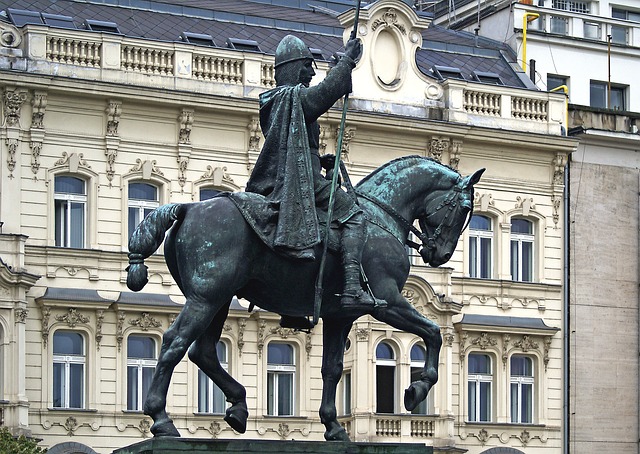The man who would be king
Features
The Rev’d Selina McMahon introduces us to the man behind the Boxing Day carol ‘Good King Wenceslas’, the Patron Saint of Czechoslovakia

Story Timeline
Saints and martyrs
- Anselm of Canterbury
- ‘Utterly orthodox and utterly radical’
- St Cuthbert – opening the door to the heart of heaven
- The saint and the sultan
- Dietrich Bonhoeffer: faith as unsovereign attention
- A maverick medieval mystic for modern times
- Mary, Mother of Our Lord
- The life and legacy of Mary Sumner
- Anglican Church remembers missionaries on New Guinea Martyrs Day
- Julian of Norwich: ‘all shall be well’
- Ugandan Anglican Martyr, Archbishop Janani Luwum
- Hildegard of Bingen
Many are the tales told of ‘Good King Wenceslas’ and his exploits on 26th December – the Feast Day of St Stephen and the second day of Christmas – when, as legend has it, he journeyed in the bitter cold to give alms. But who was Wenceslas? And, was he really ‘good’? Did he even exist? Where can we find out?
There have been a number of kings with the name ‘Wenceslas’, most notably Wenceslas IV, King of Bohemia in the 13th century, whom many erroneously believe to be the subject matter of the well-known carol. However, they (and we with them) need to travel back several centuries, to 911 in Prague (now the capital of the Czech Republic) when Wenceslas was born to a Czech duke.
Wenceslas’ mother, Drahomira, the daughter of a pagan chief, was baptised for their marriage – primarily to appease her inlaws, as her father-in-law had been converted to Christianity by St Cyril and St Methodius). Following her husband’s death, however, she became jealous of Wenceslas’ grandmother, known as St Ludmila, who had begun to rule as regent. So, she arranged for his grandmother to be assassinated and began to rule as regent herself.
Drahomira reverted to her pagan roots and began a persecution of Christians. But there was still hope. When he turned 18, Wenceslas’ remaining Christian nobles rose up and rebelled against Drahomira, exiling her and reinstating Wenceslas as Duke.
Wenceslas was a peaceful man, preferring diplomacy over conflict, and was often called ‘Wenceslaus the Good’. It is said that on one occasion, his army was squared up against a rebel’s knights. Rather than causing innocent blood to be shed, Wenceslas challenged his opponent to one-on-one combat. The challenge was accepted, but as he approached Wenceslas, his rebel opponent saw two angels standing by the duke’s side and thought surrender to be a better option.
Advertisement
Despite his peaceful ways and his reintroduction of Christianity, Wenceslas was murdered by his brother ‘Boleslaus the Cruel’ in 935. Boleslaus was prompted to kill his brother by angry nobles who were furious at Wenceslas’ decision to submit to the German King Henry I the Fowler who was planning to invade.
Almost immediately, the Holy Roman Emperor Otto I posthumously conferred on him “the regal dignity and title”, hence he is forever known as ‘Good King Wenceslas’. But it does not end there…
Disturbed by reports of miracles at Wenceslas’ tomb, Boleslaus transferred Wenceslas’ remains to the Church of St Vitus in Prague, which became a key site of prayer and pilgrimage in the medieval period.
It is also said that an army of knights sleeps under one of the Czech mountains, ready to bring help under Wenceslas’ command when the Czech people are in grave danger. Legend also has it that at this time his (that is, a male rider’s) horse will stumble, thereby revealing the location of a magical sword that can only be seen by men of great power and women – one might ask why they do not just ask a woman to point it out and spare the poor horse his stumble!
Advertisement
The carol which bears Wenceslas’ name relates a story that originated only a few years after his death – that he used to rise from his bed every night to walk barefoot to give alms to people in prison and living in poverty.
Good King Wenceslas
Good King Wenceslas looked out
on the feast of Stephen,
when the snow lay round about,
deep and crisp and even.
Brightly shone the moon that night,
though the frost was cruel,
when a poor man came in sight,
gathering winter fuel.
Hither, page, and stand by me.
If thou know it telling:
yonder peasant, who is he?
Where and what his dwelling?
Sire, he lives a good league hence,
underneath the mountain,
right against the forest fence
by Saint Agnes fountain.
Bring me flesh, and bring me wine.
Bring me pine logs hither.
Thou and I will see him dine
when we bear the thither.
Page and monarch, forth they went,
forth they went together
through the rude wind’s wild lament
and the bitter weather.
Sire, the night is darker now,
and the wind blows stronger.
Fails my heart, I know not how.
I can go no longer.
Mark my footsteps my good page,
tread thou in them boldly:
Thou shalt find the winter’s rage
freeze thy blood less coldly.
In his master’s step he trod,
where the snow lay dented.
Heat was in the very sod
which the saint had printed.
Therefore, Christian men, be sure,
wealth or rank possessing,
ye who now will bless the poor
shall yourselves find blessing





